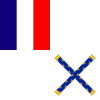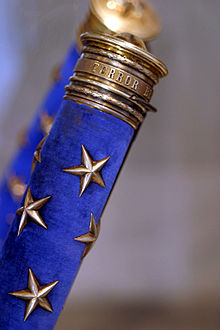
Back مارشال فرنسا Arabic Mariscal de França Catalan Maršál Francie Czech Marskal af Frankrig Danish Marschall von Frankreich German Στρατάρχης της Γαλλίας Greek Marŝalo de Francio Esperanto Mariscal de Francia Spanish Prantsusmaa marssal Estonian Frantziako marexal Basque
| Marshal of France Maréchal de France | |
|---|---|
 Rank flag | |
  Shoulder and sleeve insignia | |
| Country | France |
| Service branch | French Army |
| Rank group | General officer |
| NATO rank code | OF-10 |
| Formation | 1185 |
| Next higher rank | None |
| Next lower rank | Army general[a] |
| Equivalent ranks | Admiral of France |
| Related articles | |
| History | Marshal of the Empire |
Marshal of France (French: Maréchal de France, plural Maréchaux de France) is a French military distinction, rather than a military rank, that is awarded to generals for exceptional achievements. The title has been awarded since 1185, though briefly abolished (1793–1804) and for a period dormant (1870–1916). It was one of the Great Officers of the Crown of France during the Ancien Régime and Bourbon Restoration, and one of the Grand Dignitaries of the Empire during the First French Empire (when the title was Marshal of the Empire, not Marshal of France).
A Marshal of France displays seven stars on each shoulder strap. A marshal also receives a baton – a blue cylinder with stars, formerly fleurs-de-lis during the monarchy and eagles during the First French Empire. The baton bears the Latin inscription of Terror belli, decus pacis, which means "terror in war, ornament in peace".
Between the end of the 16th century and the middle of the 19th century, six Marshals of France were given the even more exalted rank of Marshal General of France: Biron, Lesdiguières, Turenne, Villars, Saxe, and Soult.
The distinction of Admiral of France is the equivalent in the French Navy.



Cite error: There are <ref group=lower-alpha> tags or {{efn}} templates on this page, but the references will not show without a {{reflist|group=lower-alpha}} template or {{notelist}} template (see the help page).